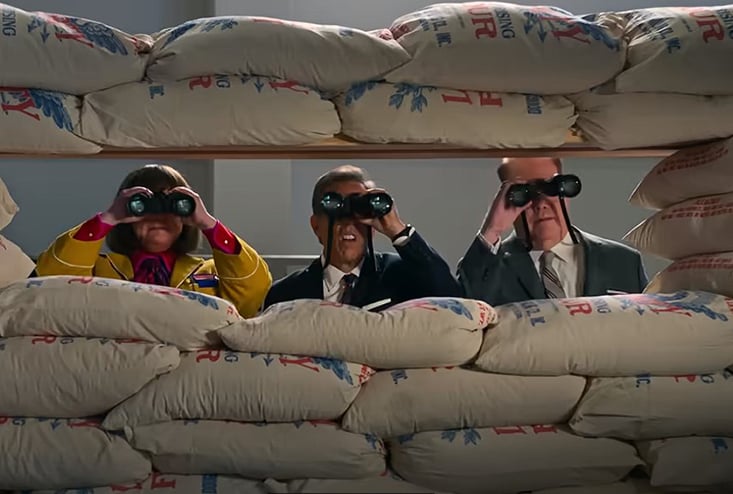More than a decade ago, Jerry Seinfeld appeared in a video deconstructing one of his jokes. The joke was about Pop-Tarts, the breakfast toaster pastry developed by the Kellogg’s company in 1964. Fast forward to 2024, and Seinfeld has directed and starred in his feature film debut, Netflix’s Unfrosted, a story about the way the now famous Pop-Tarts came to be.
The story of Unfrosted is only very loosely based on the actual events. It was the early 1960s and two rival breakfast cereal companies—Kellogg’s and Post—were in a race to develop a new way of eating breakfast. Post’s crew came up with Country Squares (essentially a pop tart) and Kellogg’s came up with the same product but with a snappier and peppier name. Branding was clearly important, even then, and events would prove that what’s on the box is often more important than what’s in the box.
This is where the similarities between Seinfeld’s telling and the true story end. In Seinfeld’s words, “the rest is lunacy.” The film includes an interesting cast. Seinfeld himself plays Bob Cabana (a fictional character) based on William Post, who developed the Pop-Tart. Jim Gaffigan is the Kellogg company owner, Edsel Kellogg III (a fictional character); Melissa McCarthy is Donna “Stan” Stankowski, a NASA scientist who is part of the Kellogg’s team; and Amy Schumer stars as Marjorie Post (the actual owner of the company at the time) and supposedly Edsel Kellogg III’s archnemesis.
There are other secondary characters, but just as important: Hugh Grant plays Thurl Ravenscroft, the real actor who was the voice of Frosted Flakes mascot, Tony the Tiger; James Marsden as the health guru, Jack LaLanne; Christian Slater as the sinister milkman working for the “milk syndicate”; among others.
Populated with late ’50s and early ’60s ephemera, such as toys, baseball cards, and Schwinn’s Sting-Ray bikes, the film is shot beautifully, with bursting colors that evoke the advertisements of the era, where life is perfect and women experience genuine thrills from vacuuming—after all, as the ad says, “You’ll be happier with a HOOVER!”
The race to create, market, and sell the toaster pastry is exaggerated in the film which, of course, is part of the gag. We enter the world of spies, nasty milkmen who are anything but “friendly,” South American “sugar” drug lords, and even JFK and Khrushchev make an appearance in this Pop-Tart saga.
Seinfeld uses his trademark and unique form of cynicism, which we have come to know in his television sitcom, Seinfeld. There appears to be great synergy between the cast members, but it is Melissa McCarthy as “Stan” who delivers a surprisingly punchy and genuine comic performance. Cracking mildly feminist jokes, she is at once her own woman and possessed of a great sense of humor but one who does not take herself too seriously.
There are many funny cameos too—Dan Levy in his brief appearance as Andy Warhol plays a character more like his persona on Schitt’s Creek than Warhol, and Jon Hamm and John Slattery show up as advertising designers (a nod to their show Man Men) presenting a Pop-Tarts ad campaign that has more to do with sex and negligees than breakfast foods for kids.
Unfrosted is a wonderful combination of childhood nostalgia and comedy and is clearly the product of Jerry Seinfeld’s genius. It is marred only by one unnecessary invocation of contemporary politics near the end when cereal company’s mascots go on a strike, led by Hugh Grant’s Tony the Tiger. It ought to have been a supremely funny scene to see all the mascots, like Snap, Crackle, and Pop, storm the headquarters of Kellogg’s. But instead, we are distracted by Hugh Grant’s costume.
Wearing nothing but Tony the Tiger’s fuzzy pants held up by suspenders, Grant has a painted face with horned headdress, presumably evoking the “QAnon Shaman,” who was arrested following the Jan. 6, 2021 demonstrations. Grant is leading the mascots into the Kellogg’s headquarters as they climb over the walls to get into the building.
Although it’s always a good idea to be able to laugh at your side of the political divide, and some of the more absurd elements of Jan. 6 can certainly evoke that kind of laughter, it’s a bit difficult to take as many of those people are still rotting in jail on trumped up charges. Overall, I think this scene cheapens an otherwise delightful film. By bringing contemporary political events into a lighthearted comedy about childhood nostalgia the film shows a one-sided willingness to offend at least half of its audience. This lack of political temperance is what tends to nullify most humor today, when everything edges toward insult that is tinged with (most often, liberal) ideology. It is especially disappointing to see this kind of indulgence coming from Jerry Seinfeld, since he is one of the few comedians who has been known to call out “PC crap” and the extreme left in comedy. Political ideology is alienating enough all by itself. It doesn’t need to insert itself into art and entertainment, where the experience can only be deflating to much of the audience.
The film also mentions that the real Marjorie Post was a “feminist icon” and an original owner of that now infamous estate, Mar-a-Lago. Indeed, she commissioned its building. After her death, she bequeathed the estate to the federal government but the government could not keep up with it financially. It was subsequently purchased by Donald J. Trump in 1985. It’s unclear what exactly bringing up this factoid in the film is supposed to trigger in the audience, but it does establish the fact that Trump lives rent-free in the minds of leftist Hollywood. It’s too bad that an otherwise funny film with excellent production values has been hijacked by the filmmakers’ inability to keep politics in its proper place.

Leave a Reply